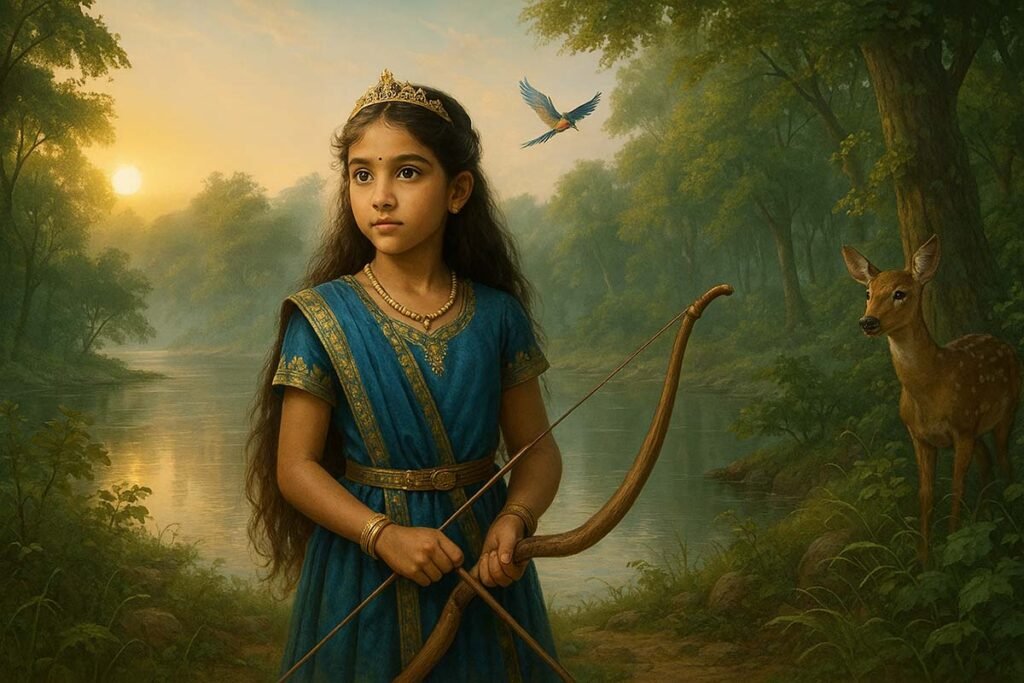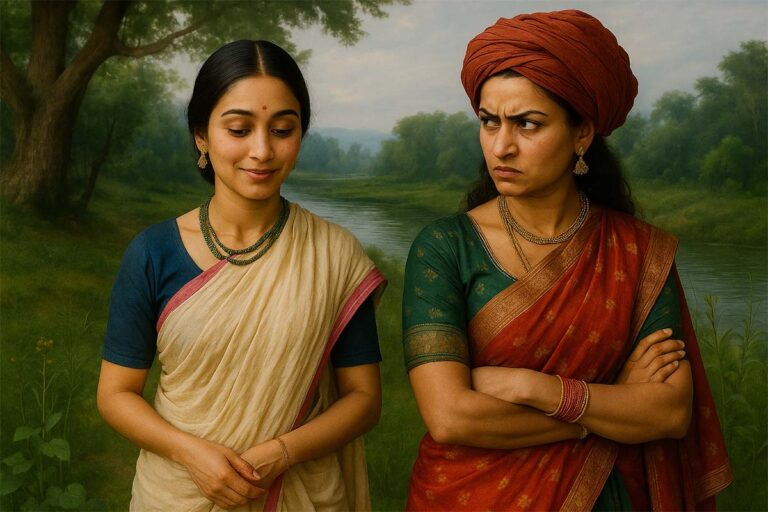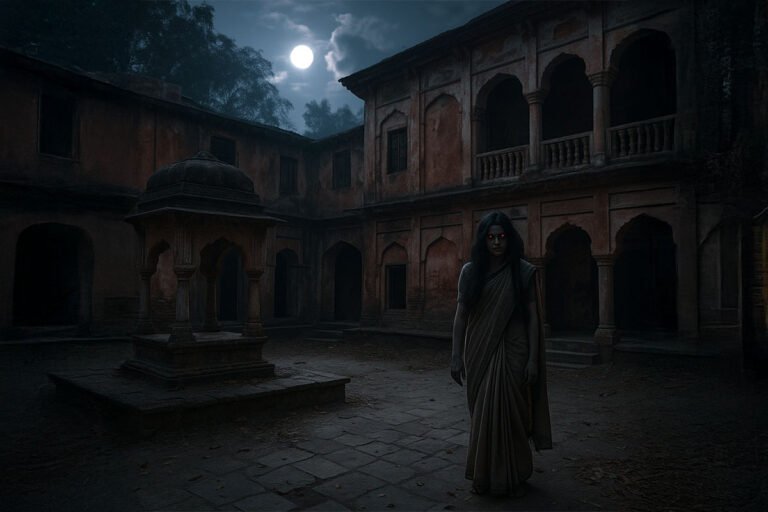Once upon a time, in the heart of Bengal, there lived a wise and gentle king and his beautiful queen. Their palace shimmered on the banks of a great river, and the whole kingdom was happy, except for one thing. The royal couple had no children.
For years, they prayed for a child. At last, their prayers were answered, and the queen gave birth to a radiant baby girl. Her skin glowed like moonbeams, and she was named Kiranmala “the Garland of Rays.”
But happiness attracts jealousy. In the shadows of the palace lived the king’s other wives, who were consumed with envy at the newborn princess. They plotted to get rid of Kiranmala and her mother, hoping to claim the throne for their own children.
One dark night, the jealous wives carried out their plan. They wrapped the baby Kiranmala and the sleeping queen in a basket and set them afloat on the river, believing they would never return.
But fate had other plans. The river goddess watched over them. The basket floated gently downstream, past hungry crocodiles and thorny reeds, until it was found by a kind-hearted fisherman and his wife. They took in the queen and the baby, raising Kiranmala as their own in a humble cottage at the forest’s edge.
Kiranmala grew up as a bright, courageous girl, quick to help, fearless in the wild, and always kind to those in need.
Back at the palace, the king was heartbroken, believing his wife and daughter lost forever. The kingdom began to fall under a shadow, crops failed, and the people grew anxious. The king longed for his lost family but did not know of the wicked plot.
As years passed, word spread about a brave and beautiful young woman living near the forest. Her kindness and courage were known in every nearby village. Tales reached the palace, but none suspected she was the lost princess.
One evening, a terrible darkness spread over the kingdom. The sun was swallowed by thick black clouds, and the air grew heavy with fear. The crops withered, children fell ill, and rivers seemed to lose their sparkle. People whispered in dread: “Rahu has returned.”
Rahu, a demon of chaos and hunger, had once been banished by the gods. Now, hungry for revenge, he had come back to terrorize the land. Each night, Rahu prowled the outskirts of the villages, his shadowy form looming over houses. Wherever he went, disaster followed. The king’s best warriors tried to confront the demon, but their swords turned brittle and their arrows missed the mark.
One evening, as Kiranmala was gathering firewood in the forest, she heard the flutter of wings. A brilliant, wise talking bird, her friend from the forest, landed on her shoulder, its eyes sparkling with intelligence.
“Kiranmala,” the bird whispered, “the demon Rahu is no ordinary foe. You must use your mind as much as your courage. Seek out your friends, for only together can you defeat him.”
That night, as Kiranmala pondered the bird’s words, the king’s men arrived at her cottage. They carried a message from the palace: “Brave Kiranmala, the kingdom needs you. You can save us from Rahu’s darkness.”
Her foster parents wept with pride and worry. Kiranmala, determined to help, took up her sturdy bow and arrows, wrapped herself in a cloak, and set off into the unknown.
As she entered the dark forest, she was joined by two faithful companions, a gentle deer, who offered speed and quiet footsteps, and the wise talking bird, who could see far and warn of danger. The river itself, who remembered the kindness Kiranmala’s mother had shown her long ago, shimmered in the moonlight and promised to help if called.
They crept through the tangled woods and found Rahu’s lair in a cave as dark as night itself. At its mouth lay piles of withered plants and broken weapons, trophies of Rahu’s destruction.
Kiranmala watched and waited. With the help of the bird, she learned Rahu’s habits. Each night, he would leave his lair and drink from the enchanted river, gaining his strength from its magical waters.
Kiranmala hatched a plan. With the deer’s help, she gathered the strongest wild vines in the forest. With the bird’s guidance, she found the thorns of a rare plant that made even the toughest demon sleepy. She wove a net and covered it with the sleepy thorns.
Then she spoke to the river. “Great Mother River, Rahu draws his power from you. Can you help me?” The river answered, “Daughter, I will flow cold as ice tonight, chilling Rahu’s heart.”
That night, as Rahu bent to drink from the river, Kiranmala signaled her friends. The deer darted past, catching Rahu’s attention. In his greed and anger, the demon chased the deer right into Kiranmala’s trap. The wise bird distracted Rahu with sharp cries, pecking at his eyes.
Kiranmala hurled her thorny net over Rahu. The sleepy thorns pricked his skin, sapping his strength. Rahu roared and thrashed, but the river suddenly flowed with icy force, making him shiver and falter. With a steady hand, Kiranmala shot her arrows, one after another, at the demon. The arrows glowed with the magic of friendship and bravery.
As Rahu stumbled and fell, Kiranmala approached with courage. “You have caused enough suffering,” she declared. With her friends beside her and her heart full of determination, she tied the weakened demon with her enchanted vines.
With Rahu captured, the shadows lifted from the kingdom. The rivers sparkled again, and the crops grew tall and green. The king, hearing of Kiranmala’s deeds, welcomed her and her companions to the palace. Only then was it revealed, through the locket she wore and the stories she knew, that Kiranmala was the king’s own lost daughter.
Kiranmala’s victory was not just in defeating a demon, but in reminding everyone that true courage lies in wisdom, teamwork, and kindness to friends, no matter how small.








